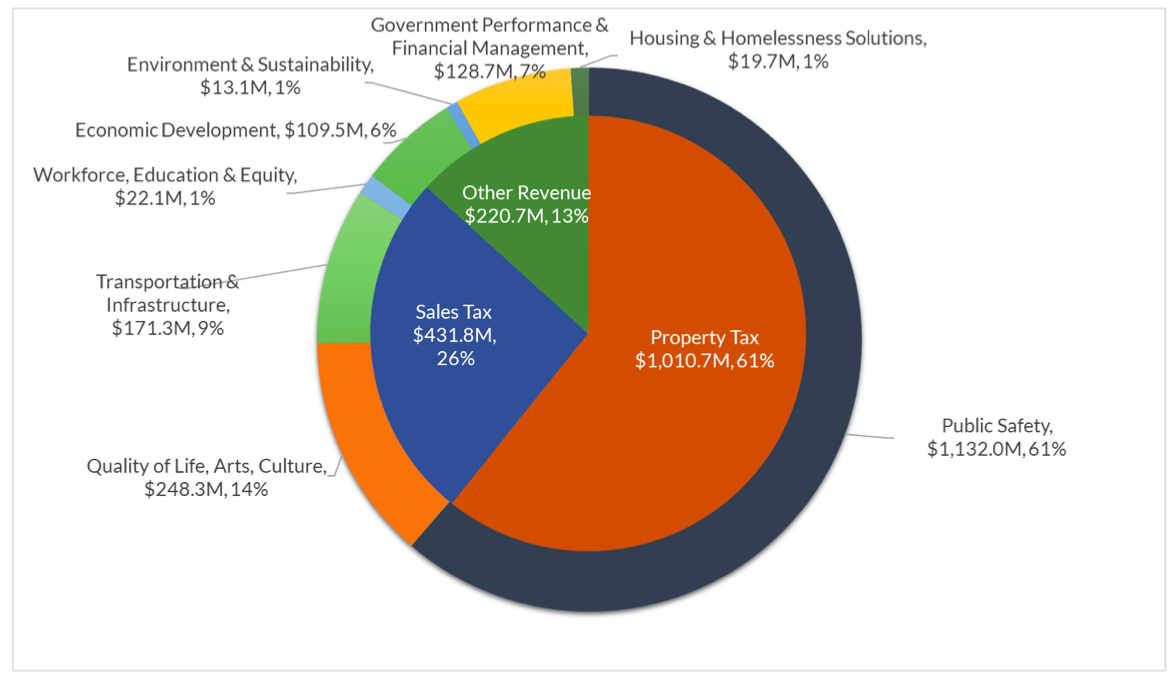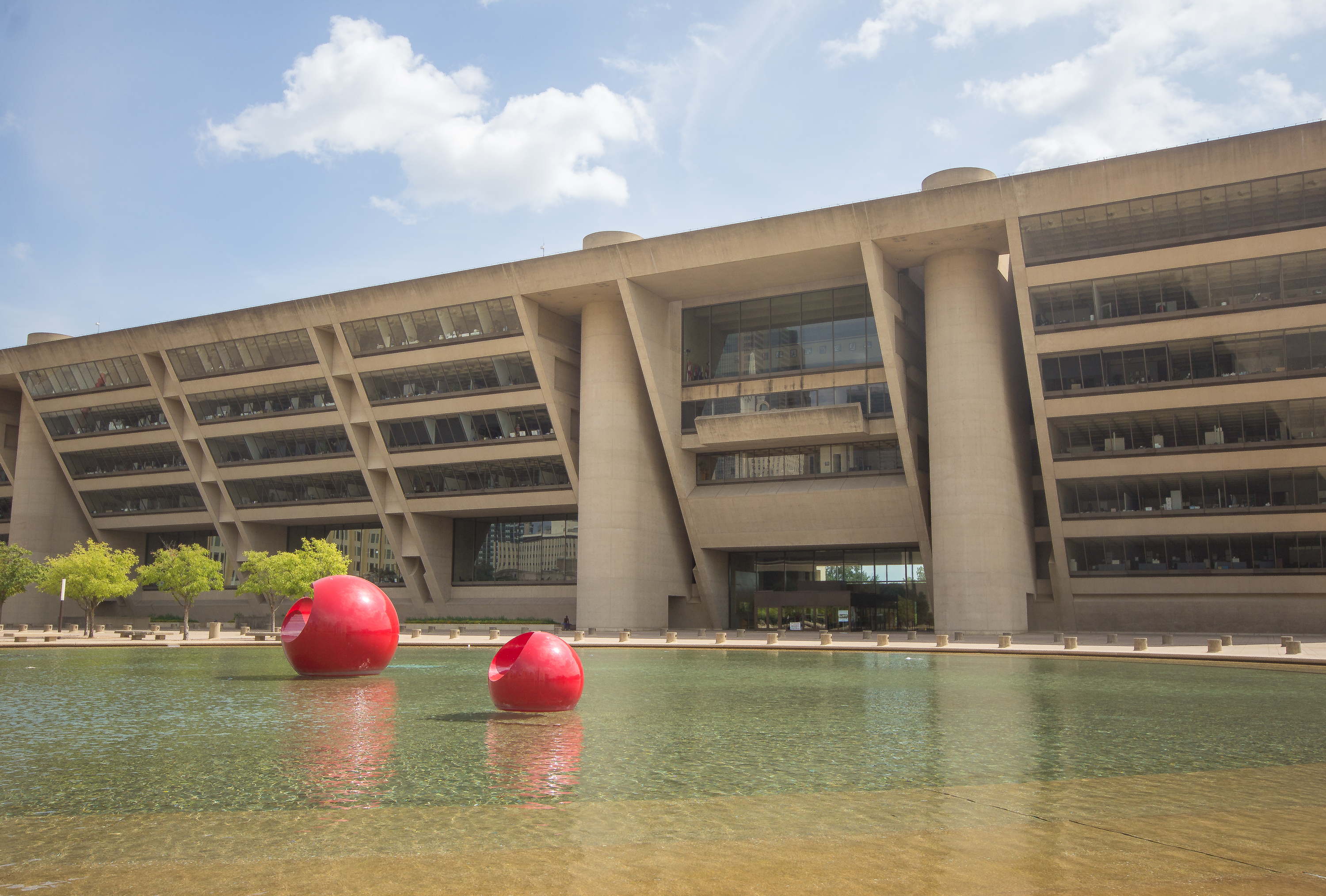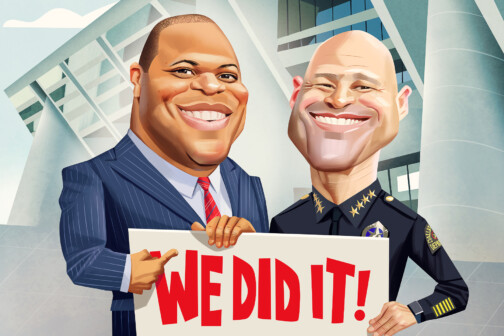The Dallas City Council capped weeks of debate on Wednesday by approving the largest budget in the city’s history without including as deep a cut to its tax rate as the mayor wanted. Ten members voted for the rate—73.57 cents per $100 valuation, about a penny less than this year’s—and approved the almost $4.9 billion budget.
Council members Kathy Stewart, Paul Ridley, Gay Donnell Willis, and Cara Mendelsohn joined Mayor Eric Johnson in voting against both the budget and the rate.
Johnson and Mendelsohn spent weeks rallying support for a tax rate five cents below what the city manager recommended. Both argued that residents wanted a more substantial property tax break than what passed. They voted against both the budget and the rate.
Both touted what they called a “No New Revenue” rate, which attracted support from political action committees that sent out text messages and launched websites. A majority of their colleagues remained unconvinced that cutting the rate by another 5 cents per $100 valuation wouldn’t require reductions to services, considering estimates showed a reduction of about $104.2 million in revenue. They were concerned it would hamstring the city’s ability to meet its infrastructure and maintenance goals.
The Council did reduce the tax rate by slightly more than what City Manager T.C. Broadnax initially proposed. But as property tax values continue to rise, it also means that many residents will still see an increase on their property tax bill next year. The city’s tax rate only represents about 29 percent of a homeowner’s total tax burden. The rise in land and property values is far outpacing what the city has control over.
Mendelsohn presented a budget amendment that would have lowered the rate to 68.38 cents. That amendment failed 12-3, garnering support from only Mendelsohn, Johnson, and North Oak Cliff Councilman Chad West.
“Telling people you voted for a tax rate reduction and sending them a higher bill is misleading to the residents,” she said. “They’re smart enough to understand their values’ (have) gone way up, the rate needs to go way down or they’re going to pay a lot more.”
Johnson insisted that the city’s property tax burden hurt lower-income Black and Latino residents the most, arguing that tax relief would also help them more than higher-income earners.
“I have seen the data. The people who want relief are the most economically challenged,” he said, adding that the idea “didn’t just come to me from nowhere.”
“It came to me from the residents of the city of Dallas. It’s actually what the residents want. It’s what they need.”
Councilman Adam Bazaldua attributed public support for the No New Revenue rate to the PAC campaign, which included text messages that urged constituents to call their council members. He said that messaging didn’t present a full picture of how the lower rate would impact city services.
“The narrative … had a coordinated campaign that asked people to tell us to go a different direction,” said Bazaldua, who represents South Dallas and Fair Park. “In fact they were being kind of pushed to tell us to go a different direction.”
The reality, several council members argued, is that the budget is growing because the city’s needs are growing. The City Council has made commitments to equity that need to be honored, said most council members whose districts are south of Interstate 30, and looming expenditures for ongoing maintenance and pensions for police, fire, and city employees will also require additional dollars.
“We’re the ninth largest city and of course, our budget should be going up,” said Deputy Mayor Pro Tem Carolyn King Arnold, whose district includes southern and eastern Oak Cliff. “Why would it go down when we’re attracting folks to come here daily?”
“We can’t say we’re going to cut staff, cut services, and then expect a better city,” said Councilwoman Jaynie Schultz, who represents North Dallas. “We also can’t cut and cut in order to give people a flat tax rate and expect their home values to go up, because things will not get better as a city. Their home values will go down and we will be actually hurting our residents if we do those cuts.”
Arnold said the city is paying more now because it is making investments in majority Black and Latino neighborhoods that it previously had not.
“Equity is uncomfortable,” she said. “We’re now paying for equity because of lack of investment over the years.” Cuts, she argued, affect residents who live in those neighborhoods the most.
“It’s a good political statement when you say, ‘I’m about equity. We want to support the historically underserved,’” she said. “It’s good when you’re campaigning, but when you begin to put the dollars behind the programs, then folks start doing the moonwalk. You want to back it up. We’re not going to back it up.”
West, the chair of the Council’s Government Performance and Financial Management Committee, said his support of the budget didn’t come easily.
“I am going to support this, obviously, but it’s with a heavy heart,” he said. “I think we’ve got a hard year ahead of us where we all have to sit down and not do this all right here next year but do it throughout the course of the year, where we re-evaluate the departments and our mission.”

So what does the $4.9 billion cover? The bulk of the spending increases go to the Dallas Police Department and Dallas Fire Rescue. The former’s budget increased by $49 million to more than $660 million. It has an ambitious goal of hiring 250 new officers by this time next year. (In August, police executives told the Council that the department is forecasted to hire 185 officers this year, but will lose 200 because of attrition.)
It also calls for 100 new firefighters next year, and 5 percent raises for sworn police officers and firefighters, and a 3 percent raise for civilian staff. The budget also calls for adding eight new 911 dispatchers and nine paramedics.
The minimum wage for city employees will increase by 50 cents to $18.50 an hour.
The budget allocates more than $140 million for street and sidewalk improvement, bridge repair, and alley improvements.
Another $4 million will bring about a dozen libraries back to pre-pandemic operation levels, which means they’ll be open six days a week. The city’s senior home repair program will receive another $1.5 million next year, and a new code compliance team to enforce the Council’s new short-term rental regulations will cost the city about $1.4 million.
While the budget totals nearly $4.9 billion, the City Council debated and approved the $4.6 billion that covers staffing and daily operations. The remaining $275 million is an accounting quirk that represents the money spent when city departments provide maintenance or other services to departments within City Hall. It also includes Dallas’ disbursements into its Employee Retirement Fund.
As the time to vote neared, several around the horseshoe said this year’s debate about the budget wasn’t unusual, and that the end result is always the product of compromises—even when it comes to the tax rate.
“There’s no losers here,” said Councilman Omar Narvaez, of West Dallas. “As our programs continue to grow and our staff is able to get stronger and implement more, the big winners are our residents.”
Those compromises are also hard-fought, said White Rock Lake Councilwoman Paula Blackmon, because every council member has varying priorities.
“I’ve been around this place for a while and there’s always a sacred cow,” she said. “Everybody’s got one. The question is are we willing to take it to the altar.”
The new budget will go into effect on October 1.
Author






